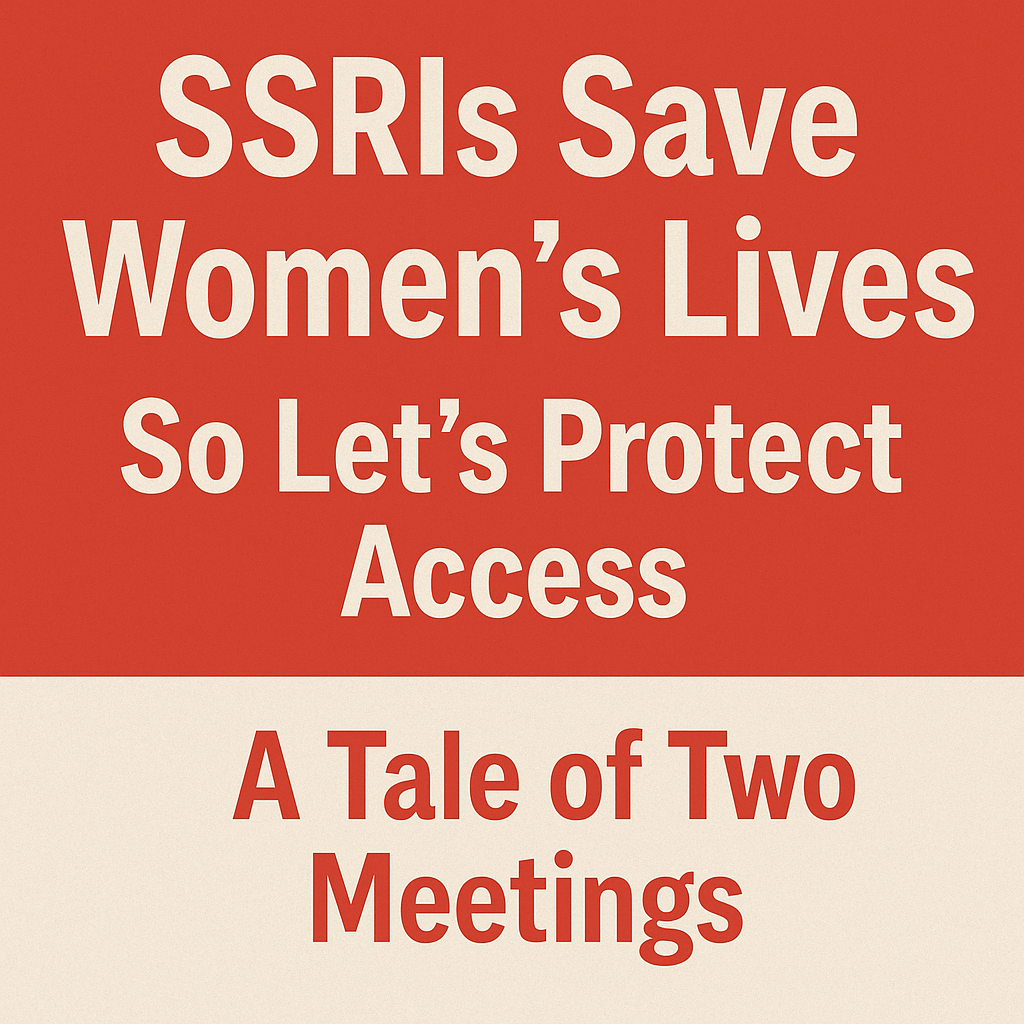By Dr. Wendy Hookman, MD
A Step Forward for Menopause Care
Last week, I watched with excitement and hope as the FDA convened an expert panel to review the black box warning on estrogen therapy.
The warning has long conflicted with scientific consensus. Over 50 years of high-quality data show that estrogen is safe and effective when used early in menopause.
Dr. Marty Makary, the new head of the FDA, spoke powerfully in support of evidence-based policy. I appreciated his clarity and candor. It was a moment of progress for women’s health.
A Step Back for Maternal Mental Health?
Tomorrow, however, the FDA will hold another meeting. This time, the topic is the safety of SSRIs during pregnancy.
I am concerned the panel may rely on outdated or misinterpreted observational studies because Dr. Makary posted about it on X. These studies are not supported by randomized controlled trials or large-scale adjusted data.
If the FDA changes its guidance based on weak evidence, it would contradict the same scientific standards Dr. Makary just upheld. The meeting will take place 7/21/25 10am-12pm and can be viewed here.
What I See as a Reproductive Psychiatrist
As a reproductive psychiatrist, I’ve spent 25 years treating and advocating for women through pregnancy, postpartum, perimenopause, and menopause.
Every week, I see women struggle with whether to take an SSRI during pregnancy. They fear harming their baby, but they also fear what untreated depression might do.
This is not a minor concern. Depression, anxiety, and OCD are among the most serious risks during pregnancy. Suicide is the leading cause of maternal death in the first postpartum year.
What the Science Really Shows
The best available research does not support the idea that SSRIs cause birth defects.
A 2024 meta-analysis published in Nature Mental Health found no significant link between prenatal SSRI exposure and major congenital malformations.
A 2024 study in Nature Medicine, using data from over 200,000 UK pregnancies, found no increased risk of:
- Low birth weight
- Preterm birth
- NICU admission
These findings held true after adjusting for maternal illness and other factors. Older observational studies often failed to make those adjustments. Many did not separate the effects of the illness from the medication.
Both the American College of Obstetricians and Gynecologists (ACOG) and the American Psychiatric Association (APA) support the use of SSRIs in pregnancy when clinically indicated, emphasizing that the risks of untreated illness often outweigh the potential risks of medication.
Misuse of Observational Data Is Dangerous
That distinction matters.
When observational data is overused or misinterpreted, it creates fear. Patients hesitate. Doctors hesitate. Treatment is delayed—or never happens.
Adding or expanding warnings based on these kinds of studies would break from the FDA’s own standard: to act on causal, not correlational, evidence.
I was especially concerned to see Dr. Makary reference observational studies in recent statements on X to support these claims.
SSRIs Save Lives—So Let’s Protect Access
SSRIs are a key part of treatment for moderate-to-severe perinatal mood and anxiety disorders.
The risks of not treating these conditions are real and well-documented:
- Poor birth outcomes
- Difficulty bonding with baby
- Maternal suicide
Compared to these known dangers, the theoretical risks of SSRIs pale in comparison.
A Call for Consistent Standards
Just last week, the FDA moved to correct outdated messaging on estrogen. That was a win for science—and for women.
Now, we must hold the agency to the same standard. Women deserve fair, evidence-based guidance at every life stage, including pregnancy.
We need science—not stigma.
???? Take Action
Help ensure maternal mental health is protected. The FDA must base its decisions on sound science—not fear.
???? Sign the petition to keep access to evidence-based care.






